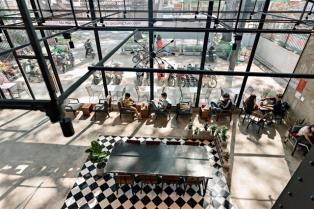Despite the global economic turmoil, HCM City has been attracting more and more investment from both overseas and domestic sources, indicated by the rising numbers of newly-established firms and capital.
 |
| According to a report from city authorities, in the first four months of this year 7,622 new local firms were licensed with total registered capital of US$2.03 billion while 12,500 others increased their capital by nearly $1.71 billion, together accounting for a 32 per cent year-on-year rise.— Photo baodautu |
by Le Hung Vong
Despite the global economic turmoil, HCM City has been attracting more and more investment from both overseas and domestic sources, indicated by the rising numbers of newly-established firms and capital.
According to a report from city authorities, in the first four months of this year 7,622 new local firms were licensed with total registered capital of VND42.55 trillion (US$2.03 billion) while 12,500 others increased their capital by nearly VND36 trillion ($1.71 billion), together accounting for a 32 per cent year-on-year rise.
Besides, 98 foreign projects with a total capital of $701.4 million were also licensed and 30 existing firms brought in another $64 million, marking a 120 per cent rise.
The HCM City EPZ and IP Authority said the stability of the country's economy, Viet Nam's membership of the proposed Trans-Pacific Partnership Agreement, and liberal investment environment are among the main reasons for the sharp increase.
The city authorities expect investments, especially from Japan, to rise further this year.
But priority will be given to investments in hi-tech industries and those with high value addition.
The city now has 332ha of land with infrastructure in place available for these projects, most of it in various IPs.
Expanding the market
HCM City is seeking to expand its market stabilisation programme by taking goods to more people, especially in remote areas.
In 2013 district authorities co-operated with producers and distributors under the programme, the Youth Union and Women's Union set up more sales outlets in residential areas, export processing zones and industrial parks, and remote villages.
As a result, as of March 815 new sales outlets were established in suburban districts, 761 more than in 2008. They include 16 in export processing zones and industrial parks and workers' tenements.
Last year companies participating in the market-stabilisation programme also organised 1,266 sales trips to EPZs and IPs and rural markets.
The HCM City EPZ and IP Authority co-operated with Nhan Dan Co. and participating firms to organise 20 sales trips every month, selling essential goods to 352,500 workers.
Le Ngoc Dao, deputy director of the city Department of Industry and Trade, said the sales networks for the programme are well-developed and cover all 24 districts in the city.
However, it remains difficult for the programme to expand in traditional markets since most vendors sell just one item.
Besides, it is hard to persuade sellers to join because of the low profits in it due to selling at 5-10 per cent below market prices.
To boost the programme, this year there are more efforts to sign up shopping centres and sales agents, with focus on suburban areas, export processing zones and industrial parks.
Businesses joining the programme have also unveiled plans to expand their distribution network.
Sai Gon Co.op Mart, for instance, plans to open more supermarkets, shopping centres, and convenience shops. it will open two more Sense City shopping centres at a cost of VND50 billion (US$23.6 million) in the Mekong Delta and invest VND60-80 billion in each of eight new Co.opMart supermarkets to be opened in Ha Noi, HCM City, Dak Lak, Dong Thap, and Pleiku.
Twenty new Co.op Food shops will be added to its network in HCM City.
Sai Gon Trading Corp (Satra) said this year it would build open more business centre and 13 shops selling Satra foods as part of a strategy to reach 50 Satrafood shops by 2015.
According to the city Department of Industry and Trade, after a decade's expansion this year the city has 8,203 outlets under the market stabilisation programme, including 3,485 selling essential food and foodstuffs. —VNS





